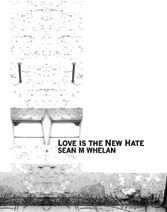 Love is the New Hate by Sean M. Whelan
Love is the New Hate by Sean M. Whelan
Hit & Miss Publications, 2003
In reading Sean Whelan's Love is the New Hate, I was invited on a journey into the hinterlands of evasive emotion, decorated by the wreckage of cryptic personal revelations. Whelan's ten poems combine a strong narrative orientation with a casual conversational cadence to pull us into his native terrain. As we become conspiratorial conscripts exploring the bounds of his uncertain subjectivity, it becomes obvious that Whelan has a real talent for enigmatic juxtaposition.
Meanwhile, he's trying to break into every room in your heart,
using only a pen, a microphone and a fresh pair of underwear.
He's the worst damn thief you ever saw in your life.
(‘Try Hard')
Whelan dances back and forth in multiple perspectives, switching fluidly from experiencing to observing, from self to other, from ordinary to absurd, magically traversing all barriers in between. Invoking fantasy and manipulating the artifice of persona allows Whelan to populate an expanding universe with charming (and not so charming) caricatures that both impersonate and ridicule a variety of social situations and scenarios.
“They call me a slut, a bimbo and a whore. Sometimes they even call me a television star.”
I remember her eyes leaking like a couple of punctured Pepsi cans. Her tears were black, carbonated and sticky.
“And people say I'm stupid,” she said.
(‘Pamela Anderson Versus the Cynical Art of the Spoken Word')
In keeping with the title of his work, Whelan both explores and exploits the ever-emerging edges of his persona's psyches. He seems especially keen to expose those elements intimately associated with discontinuities of desire, either failed or anticipated.
I look to you in a bubblegum moment
all sweet and sticky with potential.
And I see the flower spoked bicycle wheel,
spinning and sparking behind your head.
A burning halo.
(‘I'm Growing a Beard the Wrong Way Up to See the World the Way my Mouth Does')
With ‘Donkeys and Antelopes', ‘Elvis Tears', ‘Pamela Anderson Versus the Cynical Art of the Spoken Word', ‘Lemonade and Tequila', and ‘Mogwai', desire is denied for either the poem's persona or its intimate other, while in ‘A Dick of Her Own', ‘Try Hard', ‘I'm Growing a Beard the Wrong Way Up to See the World the Way my Mouth Does' and ‘Lion Heart', the fulfilment of desire is anticipated. This emphasis on desire also serves to create an ambivalent undertone that contextually unifies the poems in this collection on another level as well. For example, in ‘A Dick of Her Own' and ‘Lemonade and Tequila', a specific desire and its lack of fulfilment coexist simultaneously, creating unresolvable contradictions.
In ‘A Dick of Her Own', the desire is openly shared; by comparison, in ‘Lemonade and Tequila', the desire is a secret. Nonetheless, both poems depict elements of sympathetic/imitative magic being used to achieve fulfilment of these desires. Descriptively and metaphorically, Whelan uses the conflicts arising between internal desire and external constraints to introduce elements of dynamic tension into his poems. Despite the strong foregrounding of desire in Whelan's poetry, it is his focus on relationships, some penetratingly personal and others significantly superficial, that creates the greatest continuity in this collection. Within this context, Whelan's subdued sense of irony engages his readers as he reveals what doesn't work, what hasn't happened and what can't be done within the framework of his poetic landscape.
These elements work well particularly when integrated with the theme of rejection that is used repeatedly throughout the collection as well. The personae in ‘Donkeys and Antelopes', ‘Elvis Tears', and ‘A Dick of Her Own' experience rejection on a purely personal level. However, in ‘A Dick of Her Own', the external manifestations of female sexuality are overtly rejected as well. In ‘Pamela Anderson Versus the Cynical Art of the Spoken Word', Pamela's bid for social legitimacy represents yet another facet of rejection, a factor strongly underscored by the inability of Whelan's persona to remember her poem. In ‘Mogwai', it is Whelan's persona who rejects his lover, her possible pregnancy and his involvement in the situation, while in ‘Lion Heart', Whelan's persona rejects his life and his future by offering himself to a lion in the zoo.
Then one month you couldn't stand it anymore, and you drove down to the zoo in secret. While sitting behind wheel outside you turned your face up towards the dying afternoon sun and closed your eyes. A short film was burnt and etched upon your inside eyelids carefully detailing the next seventeen and half minutes of your life.
The last seventeen and half minutes of your life.
(‘Lion Heart')
In keeping with the overall tone of the collection, the subtext of Whelan's poems often explores the power that exists within relationships as well. Frequently, it is Whelan's persona who is the vulnerable party, although Whelan's understated humour and casual phrasing work together in creating a vibrant melange of visual and aural elements. His clever use of verse and imagery often captures the essence of metaphoric extension. Despite the nod to external circumstance and a wink at personal caprice, the poems in Whelan's collection do an excellent job of stripping off the multiple layers that comprise postmodern identity while still acknowledging the intricacies social interaction. In this work, Sean Whelan artfully articulates the interplay between internal and external spaces, self and other, fantasy and reality, accurately reflecting the disjointed and fragmented nature of contemporary culture.
Diana Young is a student at Deakin University studying for a Masters in Writing and Literature.









